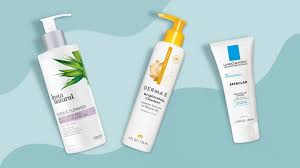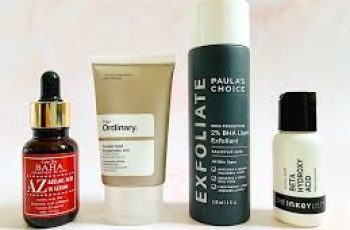
Does Face Lotion Hurt or Help Acne? How to Moisturize Acne-Prone Skin the Right Way
If you’ve ever hesitated to apply lotion to acne-prone skin, you’re not alone. The idea of moisturizing skin that already feels oily or broken out may seem counterintuitive.
After all, acne is often caused by clogged pores—so why add more to the mix?
Here’s the thing: using the right moisturizer can actually improve your acne, not make it worse. In fact, skipping moisturizer might even be contributing to your breakouts.
In this article, we’ll break down why moisturizing is essential, what causes acne in the first place, and how to choose the best products that work with your skin, not against it.
Does Moisturizer Cause Acne?
It depends entirely on the type of moisturizer you’re using. If your product contains heavy oils, waxes, or pore-clogging ingredients, then yes—it could make acne worse.
But if your moisturizer is oil-free, non-comedogenic, and formulated with soothing or acne-fighting ingredients, it can actually help treat acne and improve your skin’s overall health.
Especially if you’re using active acne treatments—like benzoyl peroxide, retinoids, or salicylic acid—your skin is likely to feel dry, tight, or flaky.
This is where moisturizer steps in to prevent your skin from becoming overly dry and irritated.
What Actually Causes Acne?
Acne forms when hair follicles become clogged with oil (sebum), dead skin cells, and sometimes bacteria. This leads to breakouts that can appear as:
Blackheads, Whiteheads, Pimples, Cysts, Pustules
Most often, acne appears on the face, chest, shoulders, and back—areas that produce more oil.
Here are the most common acne triggers:
Hormonal changes (puberty, periods, menopause), Stress, Certain medications (like corticosteroids), Diet and high-sugar foods, Heavy sweating, Touching or picking at the skin, Air pollution
Poor skincare or harsh products, Genetics
How Acne Treatments Can Affect Your Skin
Common acne treatments—especially over-the-counter or prescription ones—can be very effective. But they also come with side effects like:
Dryness, Peeling or flaking, Redness, Sensitivity to sunlight
Some of the most-used treatments include:
Benzoyl peroxide – Kills acne-causing bacteria
Salicylic acid – Unclogs pores
Topical retinoids (e.g., tretinoin, adapalene) – Promotes skin cell turnover
Oral medications – Includes antibiotics or hormonal treatments for severe acne
If you’re using these actives, moisturizing becomes essential to protect your skin barrier and reduce irritation.
Why Moisturizer Is a Must for Acne-Prone Skin
When skin becomes dry, your body may compensate by producing more oil—which only worsens clogged pores and breakouts.
A good moisturizer restores hydration, helps maintain the skin’s protective barrier, and soothes redness and irritation. This keeps the skin calm and balanced, especially if you’re treating acne with drying actives.
Here’s what a moisturizer can do for acne-prone skin:
Prevent dryness and peeling
Reduce redness and inflammation
Help active ingredients absorb more efficiently
Support healing and reduce risk of scarring
Strengthen the skin barrier and minimize future breakouts
What to Look for in a Moisturizer if You Have Acne
The best moisturizer for acne-prone skin should have hydrating, calming, and even treatment-focused ingredients.
Look for these keywords and ingredients:
“Oil-free” – Indicates the product won’t add extra oil
Non-comedogenic – Designed not to clog pores
Humectants – Like hyaluronic acid, which draws water into the skin
Niacinamide – Helps regulate oil production and reduce inflammation
Azelaic acid – Fights acne-causing bacteria
Vitamin C – Reduces redness, brightens skin, and supports collagen production
Aloe vera or green tea – Soothes sensitive, inflamed skin
Ingredients to Avoid in Acne-Prone Skin Moisturizers
Some moisturizers contain ingredients that can clog pores or irritate acne-prone skin.
Avoid:
🚫 Coconut oil and cocoa butter – Very comedogenic
🚫 Petroleum jelly – Seals in moisture but also traps bacteria and oil
🚫 Fragrances – Can cause irritation or allergic reactions
🚫 Alcohol – Dries out the skin and strips natural oils
🚫 Exfoliants with sodium chloride – Can worsen inflammation
🚫 Parabens – Controversial preservatives some prefer to avoid
When and How to Apply Moisturizer
Timing Matters
Always apply after cleansing, ideally when your skin is still slightly damp.
This helps seal in moisture and prevents transepidermal water loss.
Moisturize twice daily—once in the morning and once at night.
Reapply if your skin feels dry or tight during the day.
Expect Gradual Results
Clinical studies show that many people notice less acne within 4 to 8 weeks of using an acne-safe moisturizer consistently.
Recommended Moisturizers for Acne-Prone Skin
The Foundation Skincare collection offers dermatologist-formulated, lotion-based products designed for acne-prone skin.
These lotions hydrate without clogging pores and contain active ingredients for acne treatment and prevention.
Here’s what we recommend:
1. FS Night Renewal Cream
Key Ingredients: 2% Granactive Retinoid, peptides, botanicals
Benefits: Stimulates skin renewal without the harshness of prescription retinoids
Use: Apply nightly to treat acne and improve skin texture
2. FS Azelaic Acid 14%
Key Ingredients: 14% azelaic acid
Benefits: Kills acne-causing bacteria and reduces inflammation
Hormonal Acne: Disrupts testosterone-linked breakouts
Use: Gentle enough for daily use, even on sensitive skin
3. FS Niacinamide Lotion
Key Ingredients: Niacinamide (Vitamin B3)
Benefits: Balances oil, reduces redness, and improves skin texture
Hydration: Moisturizing base supports barrier repair
Use: Apply morning and night
4. FS Vitamin C Lotion (20%)
Key Ingredients: 20% pure Vitamin C
Benefits: Brightens skin, reduces acne-related redness, supports collagen production
Use: Use in your morning routine before sunscreen
5. FS Hyaluronic Acid Lotion
Key Ingredient: Hyaluronic acid
Benefits: Intense hydration, fast-absorbing formula
Use: Layer under or over other treatments as needed
All Foundation Skincare products are formulated for layering, meaning you can mix and match based on your needs—without fear of clogging pores or causing irritation.
Sample Acne-Safe Skincare Routine
Here’s a simple, dermatologist-inspired regimen using the products above:
Morning Routine
Cleanse with a gentle, non-foaming cleanser
Apply FS Azelaic Acid 14%
Apply FS Hyaluronic Acid Lotion
Follow with a broad-spectrum SPF 30 or higher sunscreen
Evening Routine
Cleanse again to remove makeup, dirt, and SPF
Apply FS Niacinamide Lotion
Apply FS Hyaluronic Acid Lotion
Alternate nights: Use FS Night Renewal Cream in place of Niacinamide
Key Takeaways
Moisturizer is essential even for acne-prone skin—if you choose the right formula
Hydration helps balance oil production and prevents skin from becoming too dry
Look for non-comedogenic, oil-free, and calming ingredients like niacinamide and azelaic acid
Avoid heavy oils, fragrance, and alcohol-based products
Consistent use of a gentle, hydrating routine can reduce breakouts and improve skin texture
Want more help finding the right skincare for your skin type or acne concerns?
Follow us on Instagram or explore our YouTube series The Green Sofa, where we answer your most common skincare questions and share expert advice.


